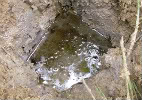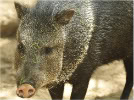Indigenous groups in a dispute with Hunt Oil, over the company performing seismic tests their land, have scheduled a meeting with the Texas based oil corporation, according to Reuters.
Prior to this, representatives of the indigenous group had said that they would defend “the protected area with their lives” and the groups were reportedly headed to the town if Salvacion to forcibly remove the company from the area in question known as Lot 76 or the Amarakaeri Communal Reserve.
“There is going to be a dialogue. We have to wait for the result of this meeting before we know about the removal,” Maria Gonzalez of FENAMAD (the Native Federation of the Madre de Dios) told Reuters.
Lot 76 is designated as a protected reserve for the conservation of biodiversity and the preservation of headwaters vital to the tribes. The issue is currently in Peruvian court.
The President of Peru, Alan Garcia, is backing the oil company arguing that while the indigenous groups own the land, the government of Peru owns the subsurface rights.
The exploitation of oil reserves in the Peruvian Amazon has become particularly sensitive since a tragic incident in June. Protesting government’s plans to extract natural resources from the Amazon, indigenous groups and police clashed. During the ensuing violence, now known as Bagua, twenty-three police were killed and at least ten protestors according to official numbers. Indigenous groups, however, say that hundreds remain missing and have asked for a Truth Commission to investigate the incident.
Related articles
Amazonian natives say they will defend tribal lands from Hunt Oil with “their lives”

(10/25/2009) Indigenous natives in the Amazon are headed to the town of Salvacion in Peru with a plan to forcibly remove the Texas-based Hunt Oil company from their land as early as today. Peruvian police forces, numbering in the hundreds, are said to be waiting in the town. The crisis has risen over an area known as Lot 76, or the Amarakaeri Communal Reserve. The 400,000 hectare reserve was created in 2002 to protect the flora and fauna of the area, as well as to safeguard watersheds of particular importance to indigenous groups in the region.
Heavy oil pollution remains in Amazon, despite company claiming clean-up is finished

(09/17/2009) A new report shows that the Corrientes region of the Peruvian Amazon, which suffered decades of toxic contamination by Occidental Petroleum (OXY), is far from being cleaned-up. The survey, conducted by US non-profit E-Tech International, found that heavy metals, volatile organic compounds, and hydrocarbons still exist at levels above the safety limits set by Peru and continue to threaten the Achuar indigenous community, who have long fought against the oil companies.
Oil road transforms indigenous nomadic hunters into commercial poachers in the Ecuadorian Amazon

(09/13/2009) The documentary Crude opened this weekend in New York, while the film shows the direct impact of the oil industry on indigenous groups a new study proves that the presence of oil companies can have subtler, but still major impacts, on indigenous groups and the ecosystems in which they live. In Ecuador’s Yasuni National Park—comprising 982,000 hectares of what the researchers call “one of the most species diverse forests in the world”—the presence of an oil company has disrupted the lives of the Waorani and the Kichwa peoples, and the rich abundance of wildlife living within the forest.